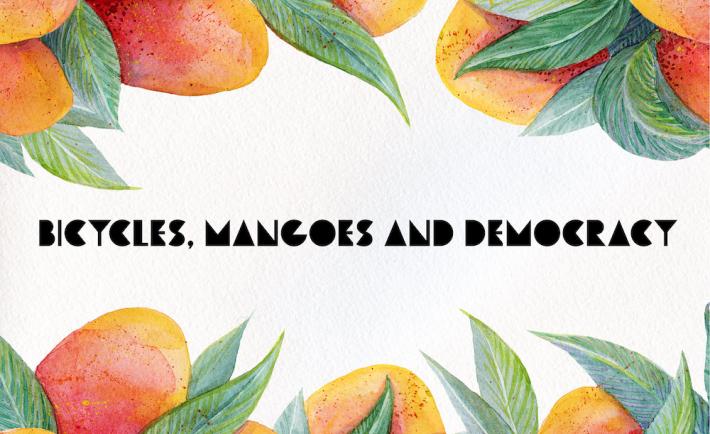During a recent trip to Uganda, my colleague Lauren and I met with political leaders and civic activists to learn more about campaigns to discourage vote buying and vote selling (both of which are illegal in Uganda) in 2016 and 2017. In rural areas, vote buying and vote selling is often called “shaking the mango tree” a reference to the abundance of mango season, when any and all can eat their fill by shaking a mango tree until the fruits drop within reach.
When we arrived in Jinja, a row of bicycles for rent were neatly lined up outside the partner organization’s office. We met inside, amidst bicycles in various states of repair, leaflets and posters on cycling and a stretcher designed to be hitched to bicycles. This all seemed a little incongruous, given a conversation about vote buying and selling. Eventually, I had to ask about the relationship between bicycles and vote buying.
The First African Bicycle Information Organization (FABIO) got its start distributing bicycles. Priority often went to health care workers, families who needed help getting their children to school and farmers who needed to get their produce to market. Soon, FABIO and its partners noted the toll that poor road conditions were taking on the bicycles. This pointed to broader problems with public services in Jinja. In some cases, children would cycle to school only to find a shortage of teachers or school supplies; patients would arrive at health care centers on bicycle ambulances only to find that the medicines they needed were not in supply. So FABIO expanded its focus to include efforts to improve public services. For them, this was a natural evolution. Bicycles and improved transportation alone are not enough to increase access to services if those much-needed services are not being provided by government. And improving service delivery requires changes in how citizens and political leaders engage each other.
In Kabale, residents of two villages shared the priorities they had raised with their elected officials during town halls that Kick Corruption Out of Uganda (KICK-U) helped organize: medical supplies for their health center; a road up the hill to their communities; and better access to seedlings. They were also concerned about soil erosion, salaries for teachers and furniture for the local school. As our conversation with the residents of Kabale unfolded, other issues came up. One villager wanted to know how beneficiaries for a new social program she’d heard about were being decided, “I’m sure I qualify, but I haven’t received anything.” Others provided updates on their member of parliament’s work in the legislature, while commenting that some of the issues they raised with local government officials had not yet been addressed. The residents noted that while they still don’t see some of their elected leaders as often as they would like, their decision to reject vote selling during the 2016 campaign had made it easier to hold their leaders accountable. If they had taken the “gifts” during the campaign period, the residents argued, it would have been much more difficult to ask questions about public services in the aftermath of the elections.
Over the course of the trip, we heard partner organizations and program participants make the connection between daily service delivery issues, governance and corruption. A pattern had begun to emerge about the strategies that FABIO, KICK-U and other members of the Alliance for Campaign Finance Monitoring (ACFIM) used to engage different communities about vote buying in 2016. We also heard how ACFIM adapted their anti-vote buying campaign for a by-election in 2017 based on lessons learned from 2016 and later supported town hall meetings in selected communities. We left Uganda with a better sense of how the anti-vote buying/vote selling campaign had become part of a much broader conversation about relationships between citizens, political parties, elected officials and service delivery. I remembered a comment from a FABIO representative: “Our bicycles have brought us far” and thought, “Amen, Sister! Amen!”
The Uganda trip was part of an ongoing USAID-funded effort to identify lessons learned from programs that help citizens and political parties engage each other on quality of life issues.

